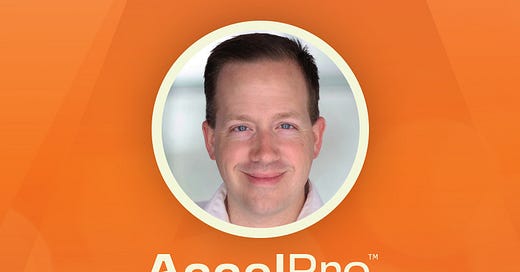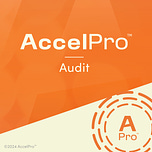Listen on Apple Podcasts, Spotify and YouTube
Welcome to AccelPro Audit, where we provide expert interviews and coaching to accelerate your professional development. Today we’re featuring a conversation with Christopher Calvin, Assistant Professor of Accounting at the University of Dayton.
Calvin, a former Deloitte consultant, digs into the diverse skills that auditors need today, and the challenges of finding and retaining talent in the field. We discuss the challenges of an aging profession, the importance of DEI initiatives and why the perception of internal audit has gone from corporate watchdog to trusted advisor.
Listen on Apple Podcasts, Spotify and YouTube
Interview References:
Christopher Calvin’s University of Dayton profile.
2:31 | 2022 Premier Global Research - Internal Audit: A Global View. (2022). Internal Audit Foundation and the Institute of Internal Auditors (IIA).
8:49 | Internal Auditing Education Partnership Program (IAEP). Institute of Internal Auditors (IIA).
14:28 | Calvin, Christopher and Eulerich, Marc and Lopez-Kasper, Vanessa. Good Cop or Bad Cop: What Drives the Self-Image of Internal Audit Functions?. (August 17, 2021).
16:21 | Sarbanes-Oxley Act of 2002, H.R.3763, (2002). |
TRANSCRIPT
I. RECRUITMENT CHALLENGES IN AN AGING PROFESSION
Alizah Salario, Host: I want to start out with how to build the talent pipeline in internal audit. Could you talk us through what some of the challenges are to finding and retaining talent in audit?
Christopher Calvin: It's actually a pretty broad challenge, especially in the internal audit field because there's no one source of the challenge. You have two main players: arguably the education system and professionals recruiting for jobs. Overseeing all of that, you've got the IIA, the Institute of Internal Auditors, who has their hand in everything.
Based on informal interviews that I’ve had, as well as formal conversations behind the scenes, what it seems is going on is one, you've got an aging profession. You can see this in some of the survey data that the IIA has put out recently, compared to some 2015 age data on the profession [as] compared to 2021. The upper end of the spectrum is increasing. People aren’t aging out as they should. You also see the lower end of the spectrum is decreasing, so younger people aren't coming in to replace the older people aging out. Part of that is a lack of student interest. Part of that is a lack of willingness to recruit students straight out of college, and instead to focus on experienced hires. And I would say those two pieces are the core problems that we're currently facing with the talent pipeline.
AS: So given what you just told us about the aging of the profession, I want to talk a little bit about how audit is taught in higher education. What are some of the ways an internal audit-focused education is distinguished from the curriculum, and how might that in turn help get younger folks into the pipeline?
CC: So this is a great question because the short answer is it's not distinguished in most schools, and that's part of the problem when I say that younger people aren't interested in many cases. The lack of interest is directly tied to a lack of knowledge. They don’t even know that the profession exists, or they have a misconception about what the profession actually does.
Most big university accounting programs are going to have external audit—that's kind of the bread and butter of these programs. It’s where most of the job recruiting goes on. Internal audit is a niche. Within some of these programs, you might see a lesson dedicated to internal audit. You might see five minutes dedicated to internal audit. You might not see anything dedicated to internal audit. And that latter scenario is probably the most common. Internal audit is ignored because in audit classes, what you're really training students to do is go into public accounting and external audit, not internal audit.
The IIA has a program, the Internal Audit Education Program, where they try to partner with schools to have a dedicated internal audit curriculum. For the schools that are part of this program, you'll actually see an entire course devoted to internal audit at the entry level. Now there's different tiers, and as you work your way up to the higher tiers, it’s not just one course, it's multiple courses with a summer program, an internship, that sort of thing. So these education opportunities are out there, but they're not the norm.
AS: You touched on my next question, which was about the internal audit education partnership. Can you tell us more about domain-specific internal audit education? I want to make sure our listeners really understand this term.
CC: When you think about internal audit and external audit, when you think about the skills necessary to do the job, they’re very similar. The main difference between these two domains is that external audit is there to protect shareholders. They're there to ensure the accuracy of financial statements, that management is following the U.S. GAAP, globally following whatever your international reporting standards are for investor protection purposes.
Internal audit is very different. They don't really focus on financial statements. Internal auditors, by definition, are there to provide assurance. They provide consulting for the company, but everything they do is within the company and with the goal of adding value, improving the company's operating efficiencies, controls, compliance, that sort of thing. And so while the skill set of audit is the same, the mindset—the what you're doing or how you're applying that skill—is very different. That difference is the thing that is not taught in most schools. It does get taught in these specialized internal audit education partnership programs, because they follow a specific internal audit curriculum.
AS: So could you unpack that for us? You talked about the skillset being similar, but the mindset is different. When we're trying to bring people into the field, what are some things that they need to consider, not just in terms of their skills, but their intellectual strengths?
CC: The biggest thing that people coming into the field should consider is, who is your audience? Who do you serve? For internal auditors, your service is to the company. Now, indirectly, you're going to benefit the shareholders. The better you make the company, the better off the shareholders are. But your service is to the company. What value can you bring?
So you've got to consider things like, did my financial statements agree with the standards and therefore I'm in conformance? Do I have this operation set up in a way where it will most efficiently get the job done, where it will provide the most value to the company? Am I in compliance with the laws in X country and Y country and Z country, no matter how different they are? Do I have the appropriate controls in place to protect the assets of the company from theft or other types of loss? The service is to the company.
And so, as far as doing that, yes, you need the audit skill set, but we've got other things on the horizon. For example, AI could be a tool. Internal auditors could try to use AI to, say, take away some of the more simple tasks of the job, putting together report templates and things of that nature.
AI could also be a threat to the company as well as a benefit, right? Internal audit should be the department that's in there analyzing, saying, okay, my company has decided to use AI. Where's the value? Where can you maximize that value? What controls do we need in place to ensure that we're not going to cause problems as well?
AS: What other opportunities do you think should be out there for internal auditors? Maybe that's existing practitioners expanding opportunities or internships. Maybe it's companies looking for recent graduates or students who are still in school and want real world experience before they graduate. Talk us through some of the opportunities that you think should be available that aren't.
CC: You nailed the two big ones. Some of these opportunities do exist, but they only exist in isolated places. For instance, the upper tier of the internal audit education partnership programs actually do have internship arrangements that they offer to their students. I went to Louisiana State University. In the program I went through, we actually have a draft. It's such a big internship program, we put our names into the draft and we had to rank which companies we want. We do all these interviews, the companies rank us, and so then everybody gets placed with the company that’s the best match. That's a great opportunity. That led to my first job with Deloitte in internal audit. But those types of opportunities exist within, say, your big accounting firms. They exist with some of the extremely large internal audit departments out there.
Places like the Coca-Cola Bottling Company have a large internal audit department. Kroger has a large internal audit department. But in the grand scheme of things, they represent a very minor portion of the opportunities out there. Unless you're in one of these big programs or you're a feeder to one of these companies with big internal audit departments or big four accounting firms, you're probably not going to have an internship opportunity that's internal audit focused.
On the other side, recruitment is one of the big hangups, right now in staffing the internal audit profession. Because what happens is companies that have their own in-house internal audit departments don't want to use the resources to train newbies, so to speak. They want to hire someone that knows what they're doing and has industry experience, or someone that has already proven themselves at a certain level of the job, say a senior auditor or a manager. So they hire experience because their clients want the experience and don't want to go through the training.
So there's this disconnect. You need people to get educated, and you need fresh bodies in the field, but then there are very few companies that want to hire the fresh bodies. That's a problem that needs to be resolved.
—
II. FROM CORPORATE WATCHDOG TO TRUSTED ADVISOR: INTERNAL AUDIT PERCEPTIONS AND REALITY
AS: I want to pivot to a related topic on DEI efforts and recruitment in building the talent pipeline. We know that companies around the globe are increasing their commitment to DEI. What is happening in internal audit? How are you bringing a greater diversity of talent into the field?
CC: The efforts are increasing for sure. Everyone acknowledges that this is an important topic. As far as internal audit specifically, I can't speak to individual internal audit-focused DEI efforts. In most schools that have an internal audit curriculum, it's housed under the accounting department.
What you'll see is accounting departments going through DEI initiatives, and internal audit is going to benefit from those programs’ initiatives. At our university, we're trying to do more outreach to get a more diverse student set within our school. We're casting a wider net, which means we'll bring in more viewpoints for the internal profession specifically. As I said earlier, you serve the client, and one of the goals is to provide value. And so bringing in diversified skill sets, diversified ways of thinking, is definitely a way to enhance that value to the companies.
It's important. DEI is something that everybody's got their eyes on. As far as recruitment goes, it's starting at the education level, and piggybacking off of what the departments that internal audit sits in are doing.
AS: So when we're talking about adding value to the field, are there other experiences or backgrounds that can prepare someone for internal audit? You mentioned having a bachelor's or master's degree in accounting. Is that paramount to succeeding, or are there other backgrounds that might be equally attractive within internal audit?
CC: So this is a hot debate that I'm having with some colleagues right now. I would say core accounting is fundamental. At the end of the day it’s still audit, which is under the purview of accounting. But advanced accounting is probably not crucial to internal audit specifically. You're not doing the books, you're not auditing the financial statements. You need to understand what you're looking at when you see a certain account name. You need to understand how transactions flow through the company.
From that perspective, there is a level of accounting knowledge you need. But internal audit is just as much a social job. You have to be able to talk to people and to elicit information from them. It's just as much an analytics job, so being able to process big data, understand what that data is telling you, and how to respond to it is important. It's as much an IT job and being able to understand company systems. And then it's as much a cutting-edge issue job where you've got to know what's the hot topic out there, whether it's ESG or DEI or something else, and be able to understand how those things are going to affect the company.
It’s not just accounting, it’s management. It is finance. It is marketing. It's business for sure. But I would not say it is necessarily accounting, even though that is where it's usually housed within universities.
AS: That's interesting because my next question is really about the perception of the field. I want to talk about a paper you wrote titled “Good Cop or Bad Cop.” You wrote about shifting audit’s stereotype as “a corporate watchdog to more of a trusted advisor.” Can you talk us through why that perception of a corporate watchdog is the case and how to shift it?
CC: I'll acknowledge right up front this is not a sole authored piece. This is a working paper I have with two of my colleagues, Mark Eurich and Vanessa Lopez Casper, out of Germany. So this is a joint effort.
Basically, about 20 years ago, the IIA tried to shift the perception of internal audit. They said, look, we're not just the auditor. We are the advisor as well. I think the shift was really an attempt to separate external from internal audit. I can tell you from my own experience, when I would go into my clients and I'd have to go talk to somebody, say in the accounting department, they'd see me coming and go, “Oh, the auditor is coming.”
It wasn't the internal auditor or the external auditor, it was just, “Oh, the auditor is coming.” Then we'd have to say, no, we're the good auditors. We're here for you. We're not the public auditors. There was this perception of a watchdog because that's where internal audits started. They started off as an assurance activity. The shift was made from ‘hey, here's what you're doing wrong’ to ‘hey, here's where it could be done better, and here's how we're going to show you how to do it better.’
I think the problem here, once again, is this idea of aging professions. You have a lot of older people working in the profession, and they came up under an assurance regime. Faculty members that may be teaching could be on the older side. There's a lot of people out there that still view auditors as the watchdog.
Now, in the early 2000s, we had big corporate scandals in the US including Enron and WorldCom. We had the Sarbanes-Oxley rollout, which mandated control testing and reporting. Then following that, we had the financial crisis.
So what happened is that internal audit was roped into disaster control to deal with all these things as they came up: to deal with this new thing called Sarbanes-Oxley, with the financial crisis, to deal with the potential for fraud. All of those things fall much more on the assurance side, rather than the consulting side of the job. From 2000 to 2009, even though there was a transition to consulting, the job was still largely about assurance because of what was happening in the world.
AS: So far you've made it really clear that this is a complex field and internal auditors wear many different hats. And I want to speak right now to AccelPro members who are existing practitioners. What would you say to them to help spread awareness about the distinct roles in internal audit?
CC: I would encourage them to get involved at the student level, whether that’s speaking at a class at a local university or at a student meeting or chapter. I say this because there was some research done where they took college grads and they presented them with job descriptions. The job descriptions were identical, save for one thing. One said accountant, one said internal auditor. Just the negativity toward the one that said internal auditor was significant. And it was the same job!
It was just the idea that the student knew what they were getting with an accounting job. They didn't know with an internal audit job. Even though most of those students won't go into internal audit, if you're speaking to business students, they're going to interact with internal audit and potentially be responsible for the internal audit hiring decision at some point in their lives.
—
III. GROWING INTERNAL AUDIT EDUCATION
AS: Before you went into academia, you worked at Deloitte. What made you shift from the corporate world to university life?
CC: In a nutshell, I've always loved teaching. Even as a college student, I would tutor other students in subjects that I had just gone through. It's something that comes naturally to me. So that was always in the back of my mind. I love to teach. And then when I was in my master's program, my department head at the time, Sam Tyrus — I served as a graduate assistant to him on some of his research — and he sat me down one day and said, you are good at this. You're going to leave and come back one day to academia. And I said, no, I'm going to go get my big four job. I'm going to work my way to becoming partner, and I'm going to live a happy life. I guess between my love of teaching and that vote of confidence in my ability to do the research side of things, it created an itch. And long story short, many years later, here I am.
AS: That's quite an endorsement. So when you do encounter a difficult situation or you're trying to make a difficult choice in your career, who do you rely on? It could be a peer or an expert in the field. Who do you turn to when you're struggling?
CC: Step number one is my wife. I look to her for advice. And actually, I told her about the itch. And then the next thing I did was I actually reached out to Sam Tyrus, my old professor, and I just said, look, you know that bug you put in my ear? I've been thinking about it. So I reached out to comfort zones: a family member, and somebody who had already shown confidence in me.
I really didn't bring it up internally at my job. At that point in my career, I was worried that if I brought it up and didn't go through with it, it would negatively affect me. I was worried about job security. I didn't want to give the wrong impression, so I kept it outside of the workplace. Where I'm at now in life, that's a little bit different. If I was thinking about leaving my academia job, I would discuss it with my superiors in the department. Things are a little bit different in academia than they are in the profession. That comfort level is there.
AS: What I like about your story is that you've come full circle, but you couldn't have done that without leaving and going to Deloitte. Tell me about how your experience there informs your research and your teaching.
CC: So going to Deloitte actually set up the basis for my understanding of how things worked. Now, granted, I'm one person and I had a long-term client. I had a couple of shorter term clients that would pop off and on. So I got to see a little variety in how different teams approached internal auditing a little bit differently, how different clients reacted to internal audit.
I also got to see some of the commonalities. When I say commonalities, I mean things like cost saving, convincing a client that internal audit is valuable, rather than just a cost center. It’s a difficult thing to do because the value is hard to measure. Operational efficiency as a result of internal audit, that would be a hard thing to measure, better controls in comparison to an alternative, that's hard to measure.
When I went into the PhD program, I said I ultimately want to research internal audit. I saw how little academic research there was in the area, and that right there is an artifact of the situation that we're in. To get research in internal audit, you need people like me who went through it, have a passion for it, went into the field, and then returned. There just aren't many of us out there. You might have more people teaching it, but they don't necessarily research it. That’s become my new passion: focusing on this whole idea of growing internal audit education and growing its presence from a research side of things.
Now I will be the first to admit that what I experienced at Deloitte is no longer relevant because that was more than 10 years ago. However, my wife does internal audit for KPMG. So I basically go home to internal audit-speak every night. I still connect to the profession through her. I connect through my service with the committee of Research and Education Advisors for the Internal Audit Foundation. I stay up to date with what's happening and what the big issues are in the profession.
This AccelPro audio transcript has been edited and organized for clarity. This interview was recorded on August 21, 2023.
Listen on Apple Podcasts, Spotify and YouTube
AccelPro’s expert interviews and coaching accelerate your professional development. Our mission is to improve your day-to-day job performance and make your career goals achievable.
Send your comments and career questions to questions@joinaccelpro.com. You can also call us at 614-642-2235.
If your colleagues in any sector of the audit field might be interested, please let them know about AccelPro. As our community grows, it grows more useful for its members.












